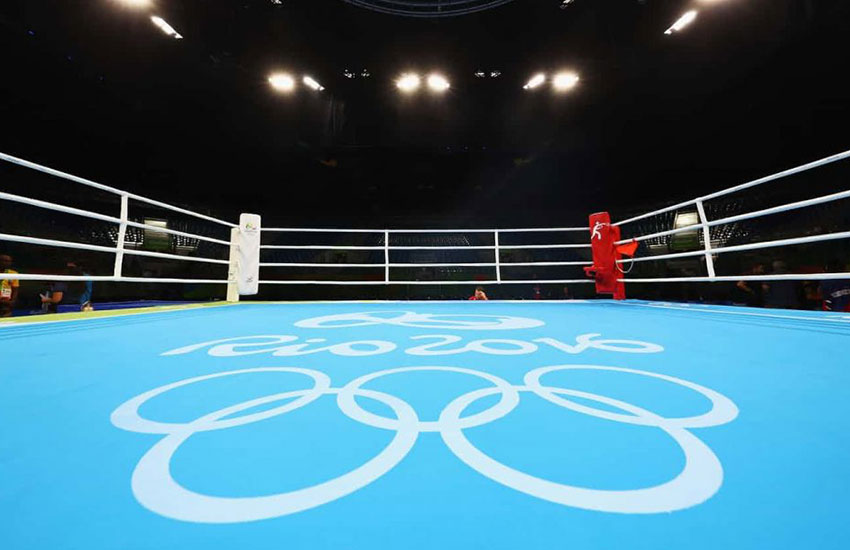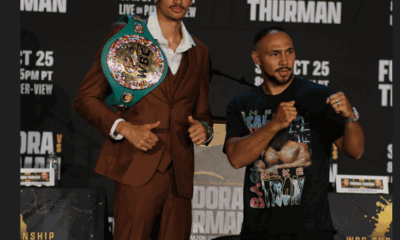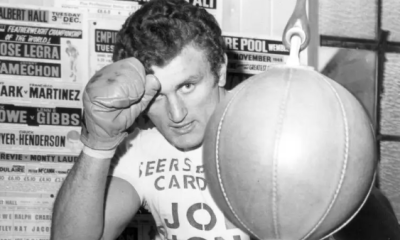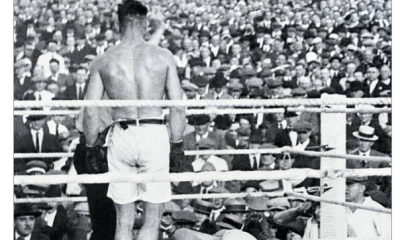Asia & Oceania
Move Over, SMU. Olympic Boxing Could Be Facing the `Death Penalty’
Drastic wrongdoing would seem to require drastic action to correct. At least that was the position of the NCAA, whose leadership took such action following the 1986 college

Drastic wrongdoing would seem to require drastic action to correct. At least that was the position of the NCAA, whose leadership took such action following the 1986 college football season when it imposed the so-called “death penalty” on Southern Methodist University, which had demonstrated an ongoing and blatant disregard for the rules in the recruitment of star players. Yes, the quasi-professional Mustangs enjoyed some spectacular success as a powerhouse program before the hammer came down, but when it did the consequences were severe. SMU did not field a football team in 1987 and ’88, and when the sport was reinstituted in 1989 the recovery period was so lengthy and painful that the school had only one winning season through 2008 and did not appear in a bowl game until 2009.
To hear some people tell it – like, for instance, former NBC Olympic boxing analyst Teddy Atlas – the callous malfeasance demonstrated by SMU’s hierarchy more than three decades ago, a group that included influential alumnus Bill Clements, then the State of Texas’ governor, is mere child’s play compared to the decades’ worth of corruption and/or incompetence messily overseen by the International Boxing Association (AIBA), the international governing body for Olympic boxing. AIBA’s failure to adequately police its own house had become so embarrassingly obvious that the International Olympic Committee (IOC), itself plagued by a series of apparent ethical lapses, has publicly hinted at levying its own version of the death penalty on boxing, whose place in the 2020 Tokyo Olympics is not ensured. The IOC has taken the position that unless AIBA can furnish proof that it has taken steps to right a litany of wrongs that includes the fixing of fights, payoffs sought and received by high-ranking officials and any number of other transgressions that range from the morally dubious to outright criminality, boxing will be conspicuously absent from the Olympic lineup two years hence.
Just when any reasonable person might have concluded that AIBA could not do anything more to besmirch its own soiled image, on Jan. 27 the Lausanne, Switzerland-based federation tossed another bucket of sludge into the supposed cleanup effort when it named AIBA vice president Gafur Rakhimov of Uzbekistan as its interim president. Although Rakhimov, who replaced Italy’s Franco Falcinelli, another interim president who resigned unexpectedly, seemed to be a logical choice to run the show as AIBA’s longest-serving VP, he ascended to the top position with more baggage than Elizabeth Taylor required when packing for an extended world tour. In December of last year Rakhimov was described by the U.S. Treasury Department as one of his country’s “leading criminals” and “an important person involved in the heroin trade.” In response to those serious allegations, the U.S. Treasury’s office of foreign assets control froze Rakhimov’s assets in American jurisdictions and prohibited Americans from “conducting financial or other transactions” with him.
An accused drug kingpin at the pinnacle of AIBA’s slippery slope? That was a new one even for AIBA, whose previous presidents included the disgraced likes of the late Dr. Anwar Choudhry of Pakistan and Dr. C.K. Wu of Chinese Tapei, who had guided the controversy-immersed federation for a combined total of 32 years, seemingly treating it as a personal fiefdom and ATM.
The storm clouds enveloping Rakhimov obliged Tom Virgets, an American of comparatively sterling reputation who recently was named as AIBA’s new executive director, to defend him on the grounds that everyone deserves the presumption of innocence until proven otherwise. But Chowdhry and Wu operated with virtual impunity, as if they were the architects and sole arbiters of their own self-serving visions for global amateur boxing. The long arm of American justice extends only so far when it comes to Olympic governance outside U.S. borders.
“Show us evidence that Gofur Rakhimov is a criminal,” Virgets said during a March interview with ATRadio. “No one has charged him with any crime, he’s never served a day of time in jail and he has no criminal record. If proof is there, prosecute. If there isn’t proof, let’s say he’s innocent until proven guilty.” Sources within AIBA told The Guardian, a British publication, that Rakhimov was the victim of a “smear campaign” and that he would be filing an appeal against the U.S. Treasury Department ruling.
Rumors of the IOC excising boxing from its summer Olympic lineup are nothing new. In November 2014, during the AIBA Congress in Jehu, South Korea, that I attended as an invited media guest of USA Boxing, Mike Martino, then the interim executive director of U.S. Boxing, told me, “I’ve been hearing for the last three Olympics that we (boxing) might be on the chopping block.”
But when the boxing competition at the 2016 Rio de Janeiro Olympics became an even more egregious showcase of barely disguised corruption, the head honchos of the IOC could no longer pretend that AIBA merely needed a bit of fixing up instead of a complete overhaul or, possibly, elimination. What has happened over the past six months or so suggests that the tough talk regarding AIBA might even translate into the Olympic version of the death penalty the NCAA’s hanging judges once slapped upon SMU.
Last December, the IOC announced it would withhold payments to AIBA until problems over governance and finances were resolved, marking the second time AIBA has had IOC funds blocked. It also happened in 2004, after a refereeing scandal at the Athens Olympics. Since then, AIBA has been working to address six governance, anti-doping and financial concerns raised by the IOC. Earlier this month IOC president Thomas Bach of Germany said during a news conference that a progress report on those issues was “insufficient,” leaving the question of retaining boxing as an Olympic sport in the near and long term very much in the air.
“This report shows some progress and shows good will, but still lacks execution and in some areas lacks substance,” Bach said. “Therefore we retain our right to exclude boxing from the program of the 2020 Tokyo Olympic Games.”
Just as SMU underwent a lengthy and painful recovery period from its “death penalty,” so, too, would amateur boxing in the U.S. and around the world were the IOC to take the ultimate punitive measure against AIBA. Atlas, who served as NBC’s color commentator for boxing at four Olympiads – 2000 in Sydney, 2004 in Athens, 2008 in Beijing and 2012 in London – said Olympic boxing going dark in 2020 and possibly beyond would extinguish what’s left of the dreams of so many aspiring young boxers who initially came to the sport with the noble purpose of someday representing their country and possibly winning a gold medal.
“It takes away another goal for these kids to shoot for,” Atlas said when contacted for this story. “A lot of young people in sports, if they are truly talented, become athletes in response to the great gifts that God has given them. It’s a way to announce themselves to the world, to make themselves and the people around them proud. When you reach a certain point in your development, of course it helps to have that carrot on a stick drawing you forward. If Olympic boxing was to be eliminated, one of those incentives would be taken away.
“But I’m not going to sugar-coat it. If that Olympic dream does get taken away from young boxers, it will be because of greedy, selfish, crooked, corrupt people. I have met them. I know about them. Take Dr. Wu. I’m so glad I had the chance to tell him off at the London Olympics. He said, `How dare you speak to me that way! Do you know who I am?’ I said, `Yeah, I know who you are. That’s why I’m talking to you that way.’”
Atlas is nothing if not direct, blunt and unflaggingly true to his own set of values. Although he still has a couple of years remaining on his contract with ESPN, which he served as a boxing analyst for 21-plus years, he was taken off the cable outlet’s main telecast team for perhaps being too direct and blunt. He ruffled some feathers when, during a post-fight interview following Jeff Horn’s disputed split decision over Manny Pacquiao in Australia, he told the winner that he had not performed well enough to deserve the victory. He also publicly questioned the boxing credentials of award-winning writer Mark Kriegel, who replaced him, a breach of propriety that also likely led to his demotion. (Full disclosure: I know both Atlas and Kriegel well, respect each and consider each to be a friend.)
It is at Olympic boxing, however, that Atlas levels his most stinging rebukes. He views the IOC-mandated reformation of AIBA to be like putting earrings on a pig, all for show and with very little substantial impact.
“What I saw, I saw over and over. What I’m saying is what I said over and over,” Atlas said of entrenched problems that never seem to be corrected in any meaningful way. “But at least I tried to do something about it and not just sit by and watch the burning of what used to be a great sport. I lost my job at NBC calling Olympic boxing because I did do something about it. I saw one robbery after another and knew it wasn’t just incompetence. It was out-and-out corruption.
“Dick Ebersol (former president of NBC Sports) gave me four minutes of live TV at the Athens Olympics to say what needed to be said, which was unheard of. So I said it. I said, in prime time, `You can take this whole damn Olympics and throw it into that beautiful Mediterranean Sea that’s behind me.’”
The Olympics will, of course, continue because there is too much money involved for them, or any of its more lucrative subsets, to be tossed out for cause. NBC Universal shelled out $7.75 billion for the exclusive broadcast rights to the six Olympiads from 2022 to 2032, a continuation of an association that began in 1992 in Barcelona, Spain, with two other Olympic rights packages prior to the most recent deal totaling $7.88 billion.
“There’s too much money involved to really change anything,” Atlas said of the IOC’s tenuous situation with AIBA. “I don’t expect much to come from what’s going on now. It’s all for show. A cover-up.”
Atlas compares Olympic boxing as presently constituted to a child’s first visit to the zoo, brimming with expectations so high that it is almost impossible for them to be met.
“When you take your kid to the zoo, what animal does he want to see?” Atlas asked, rhetorically. “He wants to see the lion, the king of beasts. He wants to see this great mane of hair, those big teeth, and hear a loud roar. But when he gets there, the lion is in pigtails. Instead of a roar, it meows. That’s what they’ve done to the sport.”
Check out more boxing news on video at The Boxing Channel
-

 Book Review4 weeks ago
Book Review4 weeks agoMark Kriegel’s New Book About Mike Tyson is a Must-Read
-

 Featured Articles3 weeks ago
Featured Articles3 weeks agoThe Hauser Report: Debunking Two Myths and Other Notes
-

 Featured Articles3 weeks ago
Featured Articles3 weeks agoMoses Itauma Continues his Rapid Rise; Steamrolls Dillian Whyte in Riyadh
-

 Featured Articles3 weeks ago
Featured Articles3 weeks agoNikita Tszyu and Australia’s Short-Lived Boxing Renaissance
-

 Featured Articles4 weeks ago
Featured Articles4 weeks agoKotari and Urakawa – Two Fatalities on the Same Card in Japan: Boxing’s Darkest Day
-

 Featured Articles3 weeks ago
Featured Articles3 weeks agoIs Moses Itauma the Next Mike Tyson?
-

 Featured Articles2 weeks ago
Featured Articles2 weeks agoBoxing Odds and Ends: Paul vs ‘Tank,’ Big Trouble for Marselles Brown and More
-

 Featured Articles2 weeks ago
Featured Articles2 weeks agoAvila Perspective, Chap. 340: MVP in Orlando This Weekend




















